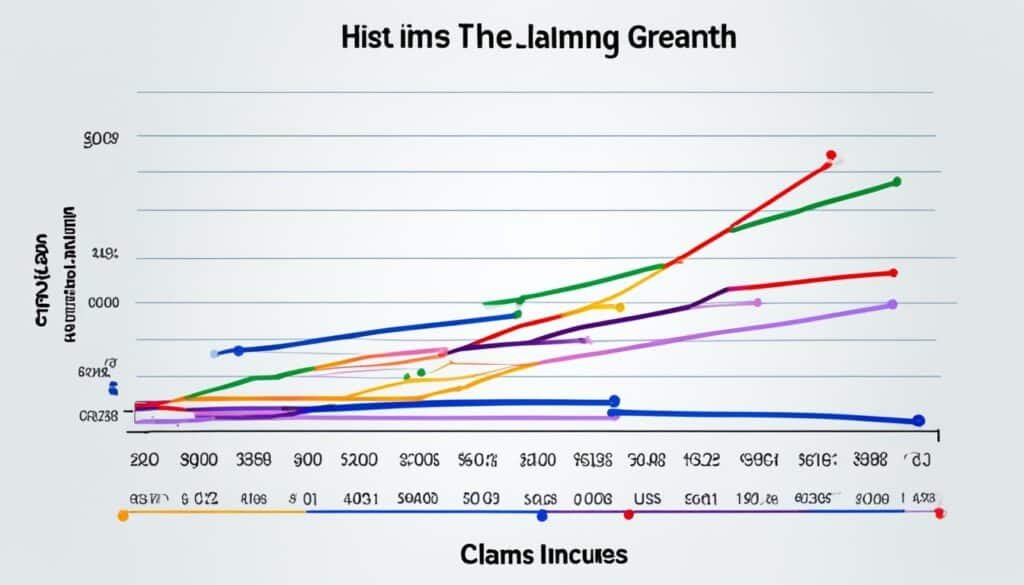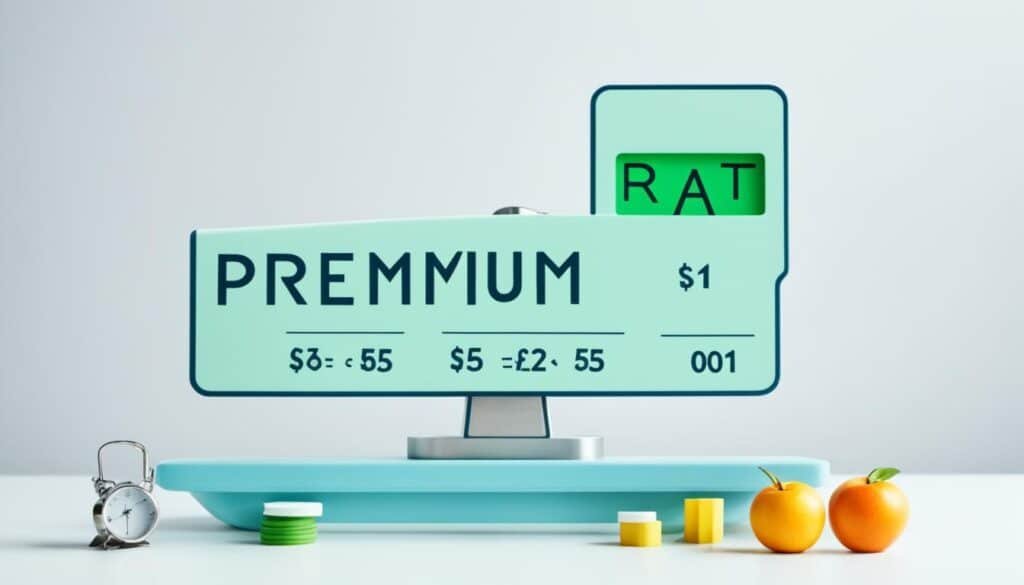An insurance premium is what you pay for insurance. It can go up for many reasons. Insurers check a lot of things to decide how much to charge. They look at your claims history, credit score, driving record, where you live, and more.
Insurance premiums go up to help insurance companies stay financially healthy. This way, they can pay for costs like repairs, replacements, and running their business. Sometimes, everyone’s premium goes up. Other times, it’s based on your own risk factors.
Knowing why insurance premiums go up is key. It helps you control your coverage costs better.
Key Takeaways
- An insurance premium is the amount paid for an insurance policy.
- Insurers use actuarial analysis and risk assessment to determine premiums.
- Premium increases are often necessary to keep insurers financially stable.
- Premium increases can be across-the-board or specific to an individual’s risk profile.
- Understanding the reasons for premium increases is important for managing coverage costs.
Introduction
Insurance premiums are like subscription payments you make to keep your insurance coverage. How insurance premiums work is very important. The amount can change a lot based on things like your age, driving history, and where you live.
Another key point is that what you pay also depends on your claims history and credit score. Plus, the type of insurance you get plays a big role. Insurers look closely at these details to set your premium.
Understanding Insurance Premiums
Insurers study a lot of data to figure out your premium. They check how likely you are to make a claim. Then, they set the price so they can cover the cost if you do.
Many things can change your premium, such as repair costs and medical bills. Even the economy and trends in the insurance industry can make a difference. Insurers have to make sure they charge enough to cover these costs.
Factors Affecting Premium Rates
Your age, gender, driving record, and claims history matter a lot when it comes to your premium. Things like your credit score and where you live also have a big impact.
Insurers look at these details to see how risky it is to cover you. Then, they adjust how much you need to pay. So, what you pay depends on these and other factors they consider.
Claims History

Your claims history really matters to your insurance rate. The Comprehensive Loss Underwriting Exchange (CLUE) database keeps track of your past claims. If you have many claims, your insurance might cost more, even if they weren’t your fault.
Impact of Past Claims on Current Rates
The CLUE database lets insurance companies guess if you’ll make more claims based on your past. This can mean paying more when it’s time to renew your insurance. The companies aim to set fair prices that also let them cover the costs of claims. So, your past claims play a big part in how much you pay.
Role of CLUE Database
The CLUE database is key for insurance firms. It shows all your claims history from various places. With this data, insurers can decide the risk you pose and then price your insurance. Therefore, understanding how the CLUE database works is really important when it comes to your insurance costs.
Credit Score Impact

Your credit score affects how much you pay for insurance, especially auto and home policies. Insurers believe those with low scores are more likely to file claims. So, they can raise your rates based on your credit score, though this isn’t allowed in all places.
Correlation Between Credit Score and Risk Assessment
They say credit scores can predict how risky you are and help set prices right. But, some people think this hurts those with less money. Even so, what your credit score looks like matters a lot to insurers when they’re checking how risky you are as a customer.
Driving Record

Your driving history is very important for insurance rates, especially car insurance. Insurers check your record for speeding tickets, reckless driving, and accidents.
Moving Violations and Their Effect on Premiums
If you have many violations, your insurance costs might rise. Insurers see these drivers as more likely to make claims. Any ticket or accident can make your insurance more expensive.
DUI/DWI Implications
A DUI or DWI can really increase your insurance costs. These violations are linked to a higher chance of future accidents. Drivers with these convictions might face very high premiums or no coverage at all.
Zip Code and Location

Where you live affects how much you pay for insurance. Insurers look at things like how many people live there, crime rates, and the risk of natural disasters. If you live in a big city or an area where accidents are common, you might have to pay more for your coverage than someone living in a quieter place.
Geographic Factors Influencing Rates
The geographic factors influencing insurance rates change from place to place. Zip codes play a big part in how much you pay. Areas with more people, traffic, and natural disaster risk can mean higher premiums. People in these places might pay more for insurance due to a higher chance of making a claim.
Cost of Living and Medical Care
The cost of living and medical care in your area also matter. They affect how much money insurers might have to pay out for claims. This means they could charge you more if you live in a pricey area with high healthcare costs.
Insurance Premium
Insurance costs are figured out by looking at many things. These help the insurance companies know how risky it is to cover someone. The things that affect insurance prices are your past claims, credit score, and driving history. But, the age, gender, and how you use your car also matter.
Factors Influencing Premium Calculations
People new to driving and younger ones usually pay more for insurance. This is because they’re seen as more likely to have accidents. Also, being male can make your insurance cost more. Statistically, boys, especially young boys, tend to drive more recklessly. The way you use your car, like for work or just fun, can also change your cost.
Age, Gender, and Vehicle Usage
Age, gender, and how you use your car are important when figuring out insurance. Insurers look at these, plus the risks you bring. This helps them set prices that match the chances of you making a claim.
Rate Increases and Claims
Insurers sometimes need to raise insurance premiums because costs go up. This includes industry-wide trends. But, how your rates change after making a claim can vary. If you make a claim but have no other claims and the fault wasn’t yours, your rates might not go up.
Still, insurance companies look at your claims history for future rates. Having many claims might make them think you’re a higher risk.
Regulatory bodies and state insurance offices also check premium rate changes. They do this to make sure the increases are fair and not too high. You, as a policyholder, have the right to know why your premiums go up. You can even challenge unfair increases by using legal and regulatory channels.
Regulatory Oversight
In the United States, insurance companies face strict oversight, mostly at the state level. This oversight aims to guarantee that premium rates are fair. The state departments of insurance check the insurers’ rate filings. They do this to make sure that the premium levels are right.
This whole process is there to protect us, the customers. It also keeps the insurance companies financially strong.
State Department of Insurance Involvement
The state department of insurance is very important for watching over the insurance premium rate filing process. When insurers want to change their premiums, they have to tell the state. Then, the state reviews it, making sure it follows the laws. This checking guarantees that the tax implications of insurance premiums and legal aspects of insurance premiums are sorted out.
Rate Filing Process
The insurance premium rate filing process is at the heart of oversight. Insurers need to show solid evidence for any premium increases. The state departments go over these submissions carefully. They check if they meet the rules and that they are fair to everyone.
If policyholders feel a rate increase is wrong, they can appeal. This process lets them speak up through the right steps.
Premium Discounts and Reductions

Trying to avoid insurance premium increases is tough. But using smart strategies can help. One way is to apply for insurance premium discounts and reductions from your insurance company.
Safe Driving Incentives
Many insurance companies reward safe drivers. If you have a clean driving record or take defensive driving courses, you may pay less. By showing you are a safe driver, you can get lower premiums. This means your coverage will cost less.
Bundling Policies
Combining different insurances, like home and auto, with one provider can cut costs. Insurers give premium discounts to those who bundle. It’s a way to thank you for being a loyal customer. Bundling means you enjoy reduced premiums.
Being proactive in reducing risks is important. Maintain a good credit score and driving record to pay less over time. Knowing how to spot premium reduction opportunities will help you save money on insurance. This means you can get affordable insurance.
Also Read: Protecting Your Enterprise: Essential Insurance For Small Businesses
Conclusion
The insurance world is changing fast. New technologies and ways of using data mean insurance premiums might become more clear and fair, which is good news for those who buy insurance. If you see the price of your insurance going up, don’t worry too much. It helps keep the insurance companies strong so they can help you out when you need it.
Your claims history, credit score, driving record, and where you live can affect how much you pay for insurance. Every so often, prices might go up for everyone. But sometimes, a price jump might just be because of how much risk you personally bring. The people in charge keep an eye on this to make sure it’s all fair, and you can ask questions if you don’t think it’s right.
Knowing why your insurance costs what it does can help you save money. By using any discounts or special deals you might qualify for, you can make sure you’re not overpaying. Plus, new digital tools are on the way. These tools could make dealing with insurance prices easier and maybe even change how we pay for insurance in the future.
FAQs
What is an insurance premium?
What factors affect insurance premium rates?
How does my claims history impact my insurance premiums?
How does my credit score affect my insurance premiums?
How does my driving record impact my insurance premiums?
How does my geographic location affect my insurance premiums?
What other factors are considered in insurance premium calculations?
How do insurance premium increases relate to individual claims?
How are insurance premium rates regulated?
How can I lower my insurance premiums?
Source Links
- https://www.progressive.com/answers/why-insurance-rates-go-up/
- https://www.investopedia.com/insurance/what-causes-your-insurance-premium-go-up/
- https://insurance.maryland.gov/Consumer/Documents/publications/Confused-by-Increases-in-Your-Auto-Insurance-Premiums.pdf




